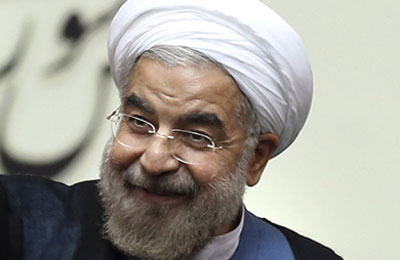
Nuclear rights are red lines says Rouhani
Dubai, November 10, 2013
Iran's president Hassan Rouhani said on Sunday that its "rights to enrichment" of uranium were "red lines" that would not be crossed and that the Islamic Republic had acted rationally and tactfully during nuclear negotiations, Iranian media reported.
"We have said to the negotating sides that we will not answer to any threat, sanction, humiliation or discrimination. The Islamic Republic has not and will not bow its head to threats from any authority," he said during a speech at the National Assembly, Iran's student news agency (ISNA) said.
"For us there are red lines that cannot be crossed. National interests are our red lines that include our rights under the framework of international regulations and (uranium) enrichment in Iran," he said.
On Saturday, Iran and six world powers failed in talks to clinch a deal to curb Tehran's nuclear programme but said differences had narrowed and they would resume negotiations in 10 days to try to end the decade-old standoff.
Rouhani, who was elected in June, is the chief architect of Iran's diplomatic drive for a nuclear deal to alleviate harsh economic sanctions on its oil and banking industries.
His negotiating team is pushing to agree a framework for steps to resolve US suspicions that Tehran wants nuclear weapons capability.
The Islamic Republic says its activities are purely peaceful and negotiators say they are ready to take the steps necessary for such an agreement if their nuclear "rights are recognised" and world powers reciprocate by easing sanctions.
Clear divisions emerged among the US and European allies on the final day of the talks as France hinted that the proposal under discussion did not sufficiently neutralise the threat of an Iranian nuclear bomb.
It is ultimately the Americans and Iranians, who have not had formal diplomatic ties for more than three decades, who have the power to make or break an agreement.
But on Saturday the attention suddenly turned to the French after Foreign Minister Laurent Fabius told France Inter radio that Paris could not accept a "fool's game" - in other words, a weak deal with Iran.
"From the start, France wanted an agreement to the important question of Iran's nuclear programme," Fabius told reporters after the meeting, which ran into the early hours of Sunday.
"The Geneva meeting allowed us to advance but we were not able to conclude because there are still some questions to be addressed," Fabius said.
Fabius' pointed remarks rankled others in the Western camp. One diplomat close to the negotiations said the French were trying to upstage the other powers and were causing unnecessary trouble for participants in the talks, which are aimed at securing a deal with Iran that has eluded the West for a decade.
"The Americans, the EU and the Iranians have been working intensively together for months on this proposal and this is nothing more than an attempt by Fabius to insert himself into relevance late in the negotiations," the diplomat told Reuters, speaking on condition of anonymity.
KERRY SEES UNITY
Kerry played down suggestions of a rift, saying, "I think tonight there is a unity in our position and a unity in the purpose as we leave here."
European Union (EU) foreign policy chief Catherine Ashton said senior political officials from Iran and the five permanent UN Security Council members plus Germany would meet again on Novemebr 20 to work on a deal.
Kerry told reporters that an agreement could be within reach.
"There is no question in my mind that we are closer now as we leave Geneva than we were when we came and that with good work and good faith over the course of the next weeks, we can, in fact, secure our goal," Kerry said.
"We came to Geneva to narrow the differences and I can tell you without any exaggeration we ... narrowed the differences and clarified those that remain," he said.
But he warned Tehran that Washington's desire for a diplomatic solution to the long-running dispute over Iran's nuclear programme was not infinite, saying the window for diplomacy "does not stay open indefinitely."
Ashton and Iranian Foreign Minister Mohammad Javad Zarif said they hoped an agreement would be signed later this month.
"We have done some intense negotiations and discussions and our objective is to reach a conclusion and that's what we will come back to try and do," Ashton told reporters.
Zarif said: "We had a very good three days, very productive three days, and it is something we can build on." - Reuters







